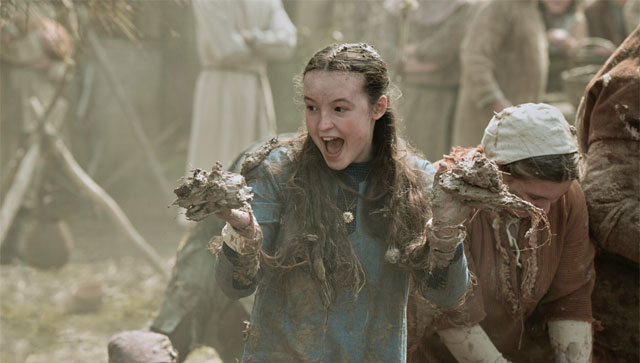There’s nothing like a “medieval comedy” by Lena Dunham that knows it’s a medieval comedy by Lena Dunham. It’s no surprise that the famous children’s novel by Karen Cushman has been Dunham’s longtime passion project. The genre, by definition, goes toe-in-hand with the filmmaker’s provocative sense of feminism, self-expression and everything in between.
This is old wine in a new bottle in its most literal form, where cheeky historical characters take great pride in occupying and taunting the period they’re in at once; where pop music disrupts and informs vintage emotions at once; where lust takes the form of adolescent hands stroking the abs of a Jesus Christ statue in a monastery; where the voiceover is a teenage diary oozing contemporary rom-com charm; and where coming of age is a punk-rock story shaped by choir-like swag. In other words, Dunham finds a home in this warped hybrid of girlhood – and Catherine Called Birdy is both weirder and richer for that. At its best, it has the whimsical energy of a retro Baz Luhrmann flick.
The only daughter of a broke shire lord, Catherine (Game of Thrones’ Bella Ramsey) loves playing in the dirt, hating on her brother and father, and being most unladylike in the eyes of the prudish elders. She wonders why women can’t fight in the crusades and attend hangings, and makes a list of things that women can’t do like a ‘90s heroine who’s time-traveled to the Middle Ages only to discover there’s no way back. The dissonance is fun to watch in this case, unlike Dunham’s doomed early-twenties sexual ballad Sharp Stick earlier this year.
Catherine, a.k.a. Birdy, starts to hide her menstrual-blood-stained rags under the floorboard once she realizes that she is turning into a ‘woman’ of marriageable age. Her father sees her as a way out of his debt problem, but Birdy does her utmost best to scare away suitors of all shapes and sizes. The problem arises when a monstrously old but rich fart named Shaggy Beard emerges to pay top dollar (pound?) for her virgin status. Even as her greedy father comes around, Birdy must decide if she can sacrifice her own happiness for the sake of her best friend and brother.
Dunham’s adaptation is nothing if not interesting. Naturally, the novel is condensed into film material – the author’s idiosyncratic and idyllic view of medieval teenhood makes way for a more purposeful and slender narrative. As is expected, then, the film veers away from the book in terms of a more ‘adult’ tone. For instance, Catherine considers her dashing uncle not just her hero but also her potential soulmate; she harbours romantic feelings for the man, complete with pangs of jealousy and heartbreak and juvenile angst. (Thankfully, the film doesn’t burn the envelope it pushes; Catherine is neither queer nor an artist). The ending is also all Dunham in the way it merges ancient fairytale with modern cultural temperatures – a duel between two men decides the fate of a girl only after the girl defines the fate of her loved ones. Some might view it as unnecessarily sharp, or even attention-seeking, but it goes well with the self-awareness of the film at large.
Somehow, the movie assumes the language of an inventive period musical without really being one. This is largely because of the terrific cast, led by Bella Ramsey’s genre-fluid performance as a girl who’s jousting with the movie she’s in. It’s been years since I’ve seen a movie face with so much character – one that can wink at the physicality of a story while being consumed by the psychology of storytelling. She is the perfect foil for “hot priest” Andrew Scott’s deceptively layered performance as Catherine’s opportunistic father. His Lord Rollo has all the cliches and originality of a villain-turned-man, and a lesser actor might have fluffed this transformation in pursuit of a funkier arc. The brew-some twosome go a long way in giving direction to passion project that’s often a heartbeat away from losing objectivity and becoming a shock-and-awe gimmick. The result is a mischievous, playful and quasi-lyrical rumination on a year-in-the-life-of format. There is, after all, nothing like a film that knows it was once a book.
Rating: 3.5 (out of 5 stars)
Rahul Desai is a film critic and programmer, who spends his spare time travelling to all the places from the movies he writes about.
Read all the Latest News, Trending News, Cricket News, Bollywood News, India News and Entertainment News here. Follow us on Facebook, Twitter and Instagram.

